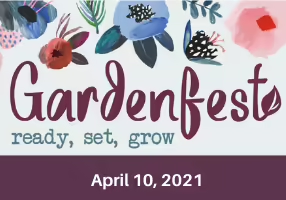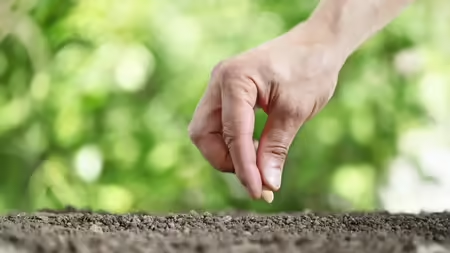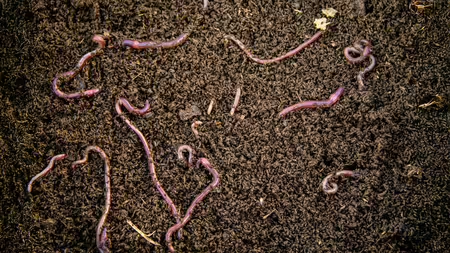
Who should attend Gardenfest?
If you're looking to improve your "green" thumb, or you're a seasoned gardener, you'll benefit from Gardenfest workshops.
PRESENTERS BIO AND INFORMATION FOR GARDENFEST 2021
If you're looking to improve your "green" thumb, or you're a seasoned gardener, you'll benefit from Gardenfest workshops. Virtual Gardenfest will consist of ONE keynote speaker and TWO breakout sessions through ZOOM. Participants will receive the ZOOM link a day prior to the event.
Sessions will be recorded for participants to view for a limited time after the event. Door prizes will be awarded to a few lucky participants.
Keynote – Diane Blazek
“INSPIRING PLANT VARIETIES FOR YOUR FUTURE GARDEN”
National Garden Bureau, after a century of inspiring gardeners, has a lot of fascinating information to share with you. Their “Year Of” program features five types of garden plants that have a lot of new and exciting varieties to ooh and aah over. Diane will share some of the innovative breeding that national Garden Bureau members are working on. Interspersed throughout the presentation will be fun statistics about gardens past, present and future.
Diane Blazek
For more than 30 years, Diane has been immersed in gardening both personally and professionally. She brings a passion to the subject based on a history in the field of horticulture publishing as well as a love for gardening and culinary exploration. Growing up on a small family farm in northern Missouri, Diane spent years helping her parents plant, tend and harvest a large home vegetable garden. As the president and publisher at Ball Publishing for 15 years, she led the way in connecting the commercial side of the industry with consumers via the live focus groups called Consumer Buzz Live! Diane also managed Ball Publishing’s entry into consumer garden book publishing. Since December of 2009, Diane has been leading both All-America Selections and National Garden Bureau through an exciting period of growth as they establish themselves as inspirational resources in the minds of garden communicators, public gardens, growers, garden retailers and home gardeners. All-America Selections has doubled in size with the addition of trials for Vegetative Ornamentals and Herbaceous Perennials, an expanded website, more Display Gardens and an ever-increasing social media presence. National Garden Bureau has also more than doubled in size with the addition of new programs, social media, therapeutic garden grants and new membership categories. With both organizations, the connection to the consumer is of topmost importance and by using that connection, she provides direction and insights to the industry as well as to GardenComm, an organization for Garden Communicators where she serves as a National Director.
6 BREAKOUT SESSIONS
1. HYDROPONICS AT MCC – Rich Tobiasz
Hydroponics is being used to grow a wide variety of vegetables and flowers. And there are systems that can easily be adapted to home use. Join Rich as he presents an overview of they use of hydroponics as a soilless method of growing plants. Finish the session with a tour of the MCC hydroponics area.
Rich Tobiasz
Rich Tobiasz grew up in Chicago gardening with his “Busia” (grandmother). By day he is a small vegetable farmer; by night he is a Master Gardener, Composter, Preserver, educator and storyteller. He lives with his wife Wendy, on a small sustainable organic farm in Spring Grove, Illinois where you can find goats, sheep, chickens, many gardens, an orchard and their sheltie Maggie Mae. He has a Master’s Degree in Crop Sciences from the University of Illinois (2011). Based on his final paper, titled: “Growing Organic, Practices and Procedures” he wrote the Organic chapter in the Illinois Master Gardener Manual. He is also an adjunct faculty at McHenry County College where he teaches both horticulture and agriculture courses.
2. LONG-BLOOMING PERENNIALS – Kim Hartmann
You will learn how to select perennial plants that have a long-bloom time and partner well together. We will share combination and design ideas to create a long progression of bloom in your perennial landscape. Create a visually striking and harmonious look for your garden using color, texture, height, and bloom!
Kim Hartmann
Kim Hartmann is a landscape designer who has been with Countryside for fourteen years. She has a B.S. in Horticulture and Communication from the University of Illinois with considerable continuing education in Landscaping. She is an Illinois Certified Nursery Professional and Master Gardener. She grew up on a farm and developed a passion for growing things and teaching others how to be successful. She conducts many educational sessions on behalf of Countryside with youth and adults. Kim is active in several industry associations, particularly the Illinois Green Industry Association, Illinois Landscape Contractors Association, and Perennial Plant Association. She was recently awarded the Illinois Green Industry Association ICN Professional of the Year award.
3. GROWING YOUR OWN BOUQUETS – Liz Cardella
A flower farmers tips for a great cutting garden. Would you like to make beautiful flower arrangements to brighten your home? Perhaps share a bouquet with family and friends? Liz explains what makes a great cut flower and the annual and perennial varieties that are most productive. Learn how to make your cut flowers last longer with proper harvesting and post harvest care. Topics covered are: When to plant, Seed starting, Bed prep and maintenance, Mulch and plant support, Harvesting /Dead heading and Post harvest care for long lasting blooms.
Liz Cardella
Liz Cardella is the owner/grower at Collie Flower Farm, a 4 acre cut flower farm located in historic Woodstock, Illinois. She has been growing flowers as a hobby for many years and decided to start Collie Flower Farm as a business in 2011. She grows fresh, unique and unusual flowers. She belongs to the Association of Specialty Cut Flower Growers which promotes growing, sharing and learning to support commercial cut flower growers. Her experience as a commercial carpenter for over 20 years has been helpful in building the infrastructure and making the tools needed for an efficient farmstead. Collie Flower Farm, aside from its two resident Collie’s, has 2 hoop houses, germination chamber, 2 cool bot walk in coolers, workshop, irrigation systems and the many other processes and tools used to get her flowers to market. She’s a proponent of the local “slow flower” movement and enjoys bringing the farms beautiful harvest to many local Florists.
4. NATIVE PLANTS - BEAUTY AND BENEFITS – Carol Rice & Kris Hall
Learn about the value of native plants for the environment and wildlife. Emphasis will be on the role that homeowners can play in providing native habitat, as the populations of pollinators, birds, and other wildlife have declined seriously in recent years.
Carol Rice
Carol Rice has been involved in several conservation organizations, with her primary affiliation being the Wildflower Preservation and Propagation Committee (WPPC), She has been active with the WPPC for over thirty years, where she initiated their mentoring program, A Natural Garden in Your Yard, in 2005. Carol lives on a 5-acre property in Barrington, where she has been involved in restoring her oak woods, and establishing extensive prairie gardens. She has given presentations to the WPPC, Wild Ones chapters, McHenry County Audubon, Illinois Native Plant Society, Wild Things, garden clubs, and more.
Kris Hall
Kris Hall started her native gardening adventure in 2007 as a mentee in the WPPC’s mentoring program, A Natural Garden in Your Yard (NGYY). From 2008 to the present she has been a mentor in the NGYY program. She is now manager for the program. Kris lives in Island Lake on one acre dotted with oaks and hickories. She has planted large native gardens among the trees, added two rain gardens, and established a small pollinator garden. A retired teacher, she has presented at MCC , MCCD, Wild Things, and garden clubs.
5. LANDSCAPING FOR BIRDS – Lisa Maier
Most birds do not come to feeders but you can easily attract them to your yard using native plants! Planting native plants is one of the easiest and most impactful things you can do as an individual to help birds. Like insects, birds have evolved with our native plants and rely on them to provide for their needs year-round and throughout their lives. For this program, we will discuss using natives to support the primary needs of birds; food, shelter, and nesting as well as other tips you can implement in your yard to attract and help birds thrive.
Lisa Maier
Lisa grew up exploring the great outdoors. She started birding 9 years ago after going through her husband’s parents old bird guides and seeing her “spark bird”, a male House Finch, at the feeder. Birding has since become a full blown obsession that she enjoys sharing with others. She is currently vice president of McHenry County Audubon, does bird surveys for McHenry County Conservation District and Bird Conservation Network, leads bird walks and trips, and participates in other citizen science activities such as Christmas Bird Count, Global Big Day and Feederwatch. Her passion for birds lead to her passion for native plants and insects. Lisa is currently a mentor for the WPPC’s ‘Natural Garden in your Yard’ program. A few years ago, her yard was featured on Cornell Lab’s YardMap website as an example of how a small suburban yard could provide habitat for birds and pollinators. She continues work to conserve birds by creating a “birding hotspot” with native plants out of an abandoned lot called “Twin Oaks” and helping her neighbors plant native gardens of their own. Lisa has over 100 bird species recorded in her yard as well as rare butterfly and bumblebee species.
6. COMMUNITY COMPOSTING- Sarah Farley & Amy DeLorenzo
In this session, we will discuss the issue of food scrap composting and explore collective solutions. The session will include an overview of compost fundamentals, principles, and models of community composting. Participants will engage in small group discussions and leave with resources and ideas on how to implement composting in their community.
Sarah Farley
Sarah Farley, M.S. serves as the Local Food Systems and Small Farms Extension Educator in Lake and McHenry Counties. In her role, Sarah develops and delivers research-based programs to growers, collaborates with community partners and coalitions, and extends University resources to meet the needs of those involved in the local food system. Since joining University of Illinois Extension (UIE) in August 2020, Sarah has contributed to compost education initiatives including partnering with the Solid Waste Agency of Lake County (SWALCO) on a multi-stakeholder USDA-NRCS grant. UIE is contributing by leading a compost and food production garden education program for a recently established community garden network that encourages the generation and use of finished compost. This project enables collective efforts to divert organic waste from landfills, improve soil quality, and increase fruit and vegetable production unlike traditional organic waste diversion efforts targeting backyard composters and landscapers. Sarah is also a compost education curriculum developer on the Cook County Composting Initiative team. She serves on the Center for the Agrarian Learning at MCC Industry Council and McHenry County Healthy Living Coalition (MAPP). Originally from Pennsylvania, Sarah earned a B.S. in Animal Sciences, Agribusiness Management at Penn State and a M.S. in Agriculture and Life Sciences from Virginia Tech.
Amy DeLorenzo
Amy DeLorenzo is an Extension Educator located at the Discovery Partners Institute in downtown Chicago. Being placed at the Discovery Partners Institute has allowed her to operate at the intersection of food & ag, and technology. She is also a food waste scholar whose interest in the subject is grounded in social justice and redistribution of food to those in need. She earned her master’s degree from the University of Guelph in Ontario, Canada. Prior to joining UIE, Amy worked in both food systems and community organizing in Chicago for the previous decade. Her journey through the food system placed her at a variety of points along the supply chain, including food rescue, food distribution and food scrap collection. She is involved in many organizations working to both reduce waste and create value in the regional food system, including but not limited to: the Chicago Food Policy Action Council, the Illinois Food Scrap Coalition, and the Wasted Food Action Alliance. She is also a member of the Institute for Food Technologists. Amy is currently working with members of Cook County Composting Initiative to design curriculum about compost education, and create a culture of composting across the state of Illinois.
Please consider supporting our past vendors.
Thank you to McHenry County College for the graphic usage.
.

